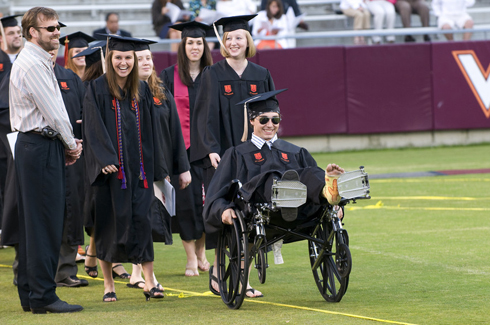Faculty, staff volunteer ushers work diligently to assist commencement visitors with disabilities

In the early morning hours of May 17 as approximately 35,000 people prepare to attend the university’s commencement exercises on campus, hundreds of Virginia Tech employees will be hard at work finalizing last minute details.
In addition to the countless hours of work done by employees in the Facilities Services and Office of the President in the weeks and months leading up to commencement each year, more than 150 volunteers will spend the day serving as ushers during the undergraduate and graduate ceremonies.
The Graduate School Commencement Ceremony will begin at 8:30 a.m. at Cassell Coliseum. The University Commencement Ceremony, for undergraduate students, will begin at 12 p.m. in Lane Stadium/Worsham Field.
During the event, ushers will assist guests as they enter and exit each of the commencement venues. University officials estimate that more than 1,500 of those guests will need assistance or accommodations due to a disability. While many of those individuals will be in wheel chairs, many others will have less visible disabilities, said Pamela G. Vickers, ADA coordinator.
“It’s paramount to us that every single person who comes onto our campus, whether they are a student, employee, or visitor, feels absolutely welcome,” said Vickers, who oversees University ADA Services, housed in the Office of Equity and Access in the Department of Human Resources.
In addition to a growing number of elderly visitors who often need assistance navigating the steep pathways of both Cassell Coliseum and Lane Stadium, many other guests have other impairments. A sign language interpreter is available at both ceremonies each year to assist guests with hearing impairments.
All of the more than 150 volunteers who will serve as ushers on commencement day undergo training each year on how best to interact with individuals with disabilities. During the training, Vickers makes sure that the ushers are aware of the location of accessible seating, restrooms, and pathways in each venue, and she offers guidance to them about a variety issues, including how to avoid making assumptions that every individual with a visible disability needs assistance.
“Individuals with disabilities generally want to be treated just like everyone else,” said Vickers. “It’s just that their needs may be different.”
The ushers learn “disability etiquette” that includes the following common courtesies:
- Ask the individual if assistance is needed and listen to any instructions the person may want to give.
- Avoid touching a person’s wheelchair, cane, walker, or other medical device until the need for assistance has been asked.
- When offering assistance to someone with a vision impairment, avoid leading the person and instead allow the person to take your arm.
- Speak directly with the individual with the disability, rather than to a companion who may be along.
- When talking with a person in a wheelchair for more than a few minutes, place yourself at the wheelchair user's eye level to spare both of you a stiff neck.
- Avoid speaking to, or petting, service animals.
Carol Papillon, who volunteered as an usher during last year’s graduate commencement exercise in Cassell Coliseum, recalls being able to assist a disabled guest with two young children of one of the graduates. Papillon is an instructor in the Department of Human Nutrition, Foods and Exercise.
“It was very rewarding to be able to help them find accessible seating and see how truly excited they were about being there to see their loved one graduate,” said Papillon, who is volunteering in this capacity again this year.
Individuals who desire accommodations are asked to make those arrangements in advance by calling 540-231-3788.




